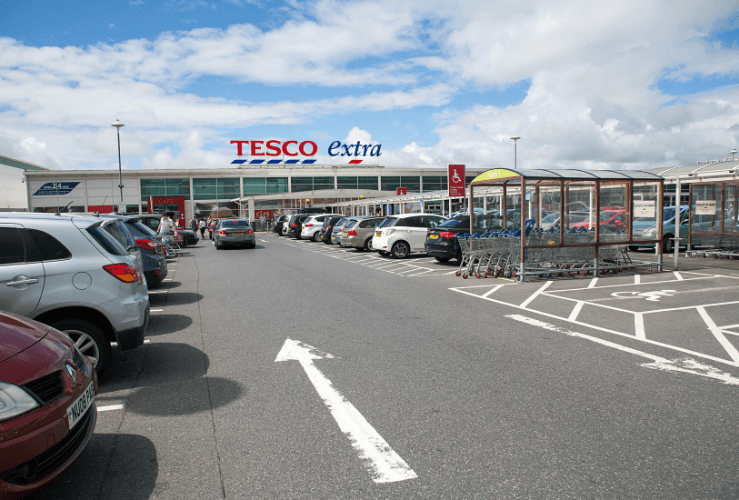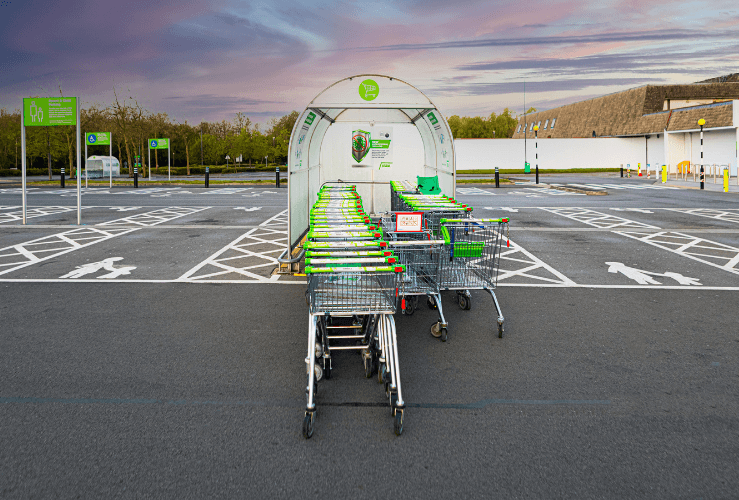Are you confused about supermarket car park rules?
In this article we look at some of the key things to be aware of - and some commonly-asked questions on the topic.
Be aware that rules can differ wildly between car parks - so do make sure you read the displayed parking rules before you leave your car and enter the supermarket.
 Not having a parking ticket
Not having a parking ticket
The majority of urban supermarket car parks levy charges. In such locations you'll need to 'pay and display' a parking ticket issued by one of the on-site ticket machines.
Out-of-town supermarkets may offer free parking, but you may still be required to obtain and display a free parking ticket from the machine.
Wardens can then check to see if you've parked up too long (see next point).
 Credit: Sue Edmondson - stock.adobe.com
Credit: Sue Edmondson - stock.adobe.com
Maximum allowed stay for a supermarket car park
The vast majority of supermarket car parks have a maximum allowed stay - usually of between one and three hours.
If you go over this time limit, you could be handed a fine. But how efficiently or strictly a car park is patrolled varies between locations.
A list of rules should be displayed on a sign in the car park.
Note that some car parks are fitted with Automatic Number Plate Recognition (ANPR) systems that recognise number plates and can therefore alert the wardens if a car has overstayed the minimum parking period.
A private car parking firm must be a member of the British Parking Association (BPA) or the Independent Parking Committee (IPC) in order to request a driver's address via the DVLA.
However, such recognition systems are not infallible. In one example, a couple from Liverpool were hit with a fine after they used a supermarket car park, returned home, then several hours later visited the supermarket's petrol station. The recognition system's interpretation was that they had parked up for more than five hours.
Parking up too early
Some supermarkets may not permit parking before a certain time on certain days - eg Sundays before 10am.
Again, make sure you read the signs.
 Credit: Jackie Davies - stock.adobe.com
Credit: Jackie Davies - stock.adobe.com
Parking in a disabled space without displaying a Blue Badge
You could be fined if you park in a space reserved for disabled drivers and do not have a Blue Badge displayed. Gov.uk states: "Blue Badges help people with disabilities or health conditions park closer to their destination".
Not meeting the minimum spend in the supermarket
Some supermarkets allow people to park for free so long as they spend a set minimum amount in store. This minimum ranges from a few pounds to £50. See ‘validate parking’ below.
 Credit: Jon Le-Bon - stock.adobe.com
Credit: Jon Le-Bon - stock.adobe.com
Supermarket child/parent parking spaces
Rules among supermarkets vary when it comes to child/parent parking spaces.
In general, to park in a child/parent parking space, you should be accompanied by a child aged 12 or less.
If someone parks in a child/parent space but does not have a child with them, they will probably be asked to move their vehicle (via the supermarket’s public address system).
It's also possible a fine may be levied for those who refuse to move their vehicle.
Are supermarket car park fines enforceable?
Do you have to pay supermarket car park fines? In short: not necessarily.
Supermarket car parks are usually run by private firms, which issue 'Parking Charge Notices' if they deem a rule to have been broken.
Conversely - and confusingly - local councils issue ‘Penalty Charge Notices’.
Both these and Parking Charge Notices have the same 'PCN' abbreviation and are chequered yellow, making them hard to distinguish.
However, in general Penalty Charge Notices issued by councils should be paid, while Parking Charge Notices are "an invitation to pay".
If you feel you have been unfairly charged a Parking Charge Notice, you might consider appealing against it. An unfairly issued ticket may be the result of unclear signage, broken ticket machines, or honest human error.
It's good to have photos, receipts and witness statements to back up any appeal.
You should not ignore a Parking Charge Notice, since you could be taken to court by the company that issued it.
An unsuccessful appeal could mean losing the right to pay at the reduced rate.
What does ‘validate parking’ mean?
Generally speaking, when a parking ticket is "validated" it means it is free (or provided at reduced cost) because the person parking made a minimum purchase at the adjacent store.
It also prevents people from parking up without spending money in the associated shops.
Why do supermarket car parks have height restrictions?
Supermarket car parks enforce height restrictions on vehicles that are too high, since they can cause obstructions. A height barrier of around 2m is installed to prevent access to tall/large vehicles.
Some car parks may have height restrictions based on ceiling/roof height - if applicable.
Do private car parks need a licence?
No, private car parks in the UK are unregulated. However, in order to enforce parking rules, those rules must be displayed clearly. That's why unclear signage is a common way of appealing a Parking Charge Notice.
Are supermarket car parks private land?
Yes, supermarket car parks are owned by private entities - whether that's the supermarket itself or a car park firm.
If the land was public, a Penalty Charge Notice would be levied, rather than a Parking Charge Notice.
Is a supermarket car park a public highway?
No, a supermarket car park is built on private - not public - land.




